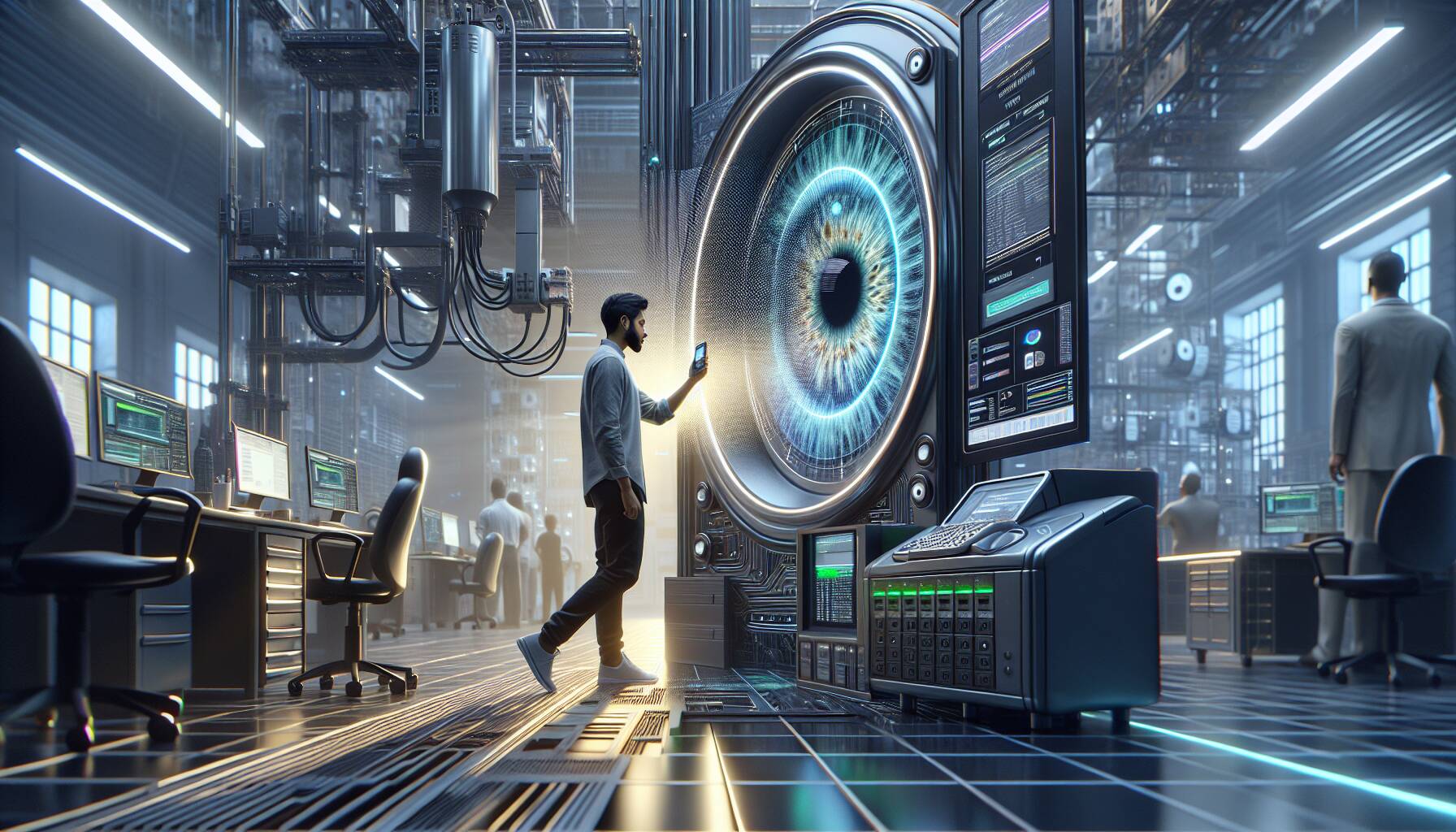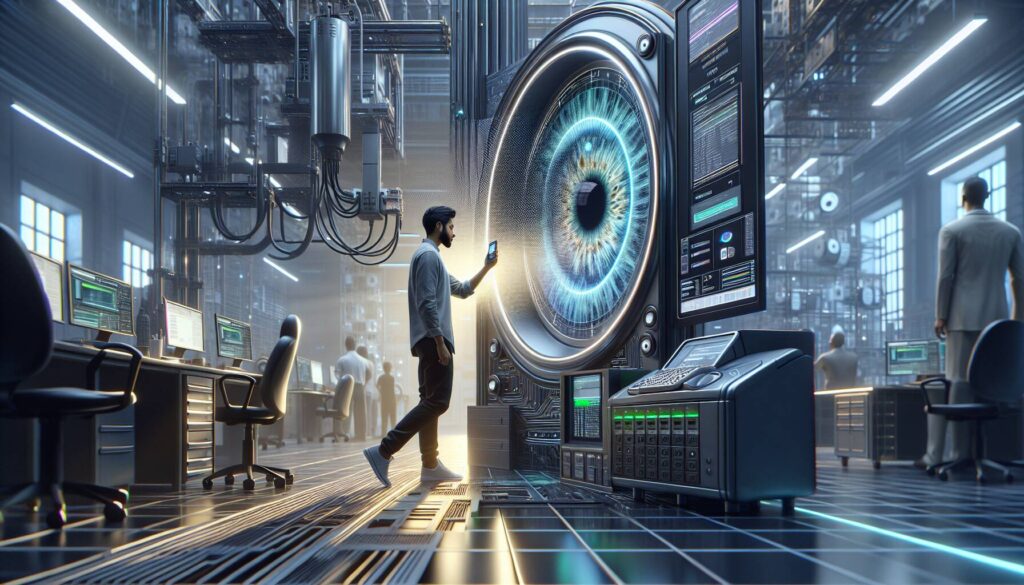In a bold move poised to redefine identity verification in the digital age, Sam Altman’s blockchain initiative, World, is set to launch across the United States. This ambitious project plans to roll out 7,500 eye-scanning devices, referred to as “orbs,” by the end of the year, targeting major innovation hubs like Atlanta, Austin, Los Angeles, Miami, Nashville, and San Francisco. The orbs, designed to confirm users’ identities through a quick eyeball scan, are being billed as a solution to an increasingly automated world where distinguishing between human and AI-generated content is crucial.
“We needed a way for authenticating humans in the age of artificial general intelligence,” Altman remarked at a recent press conference in San Francisco, explaining the motivation behind World—an initiative that reportedly predates his work with OpenAI.
Those who brave a look into the orbs will unlock access to the associated World app, along with an airdrop of the newly minted WLD token. With plans to engage over 180 million Americans and make these eye-scanning devices commonplace, World aims to create a network that will seamlessly integrate within daily life. The possibilities don’t stop with identity verification; the World app is now introducing features like crypto-backed loans and will soon offer a Visa debit card enabling WLD holders to spend their tokens as cash.
Furthermore, Altman’s vision extends into the realm of online dating, as World’s technology will be piloted within platforms like Tinder to help verify users’ ages, showcasing the versatility of this identity verification solution. As the company nears its ambitious rollout, it has also announced plans for a manufacturing facility in Richardson, Texas, aimed at producing the necessary orbs and ensuring a steady supply for the expansion.
“They will really be everywhere,” said Alex Blania, co-founder of Tools for Humanity, conveying the company’s ambitious vision of ubiquity for their identity verification technology.
As cryptocurrency and blockchain technology continue to intersect with daily life, World’s innovative approach to human authentication is a clear indicator of how these advancements are shaping the future. With a regulatory environment that has grown increasingly receptive under the current administration, the cryptocurrency landscape looks set for more pioneering projects like World.

Sam Altman’s Controversial Blockchain Project: World
Sam Altman’s new blockchain initiative, World, is set to launch in the U.S., featuring 7,500 eye-scanning devices known as “orbs.” This project could have significant implications for identity verification and the integration of cryptocurrency into everyday life.
- Launch of Eye-Scanning Orbs:
- 7,500 chrome, bowling ball-shaped devices will be rolled out across major U.S. cities.
- The initial cities include Atlanta, Austin, Los Angeles, Miami, Nashville, and San Francisco.
- Accessing the World App:
- Users will gain access to the World app and receive an airdrop of WLD tokens by using the orbs.
- The aim is to provide access to over 180 million Americans by end of the year.
- New Features in World App:
- Integration of crypto-backed loans through Morpho’s non-custodial lending protocol.
- Access to prediction markets via Kalshi.
- Ability to spend WLD tokens with a newly introduced Visa debit card.
- Identity Verification Innovation:
- Work with online dating apps like Tinder to verify users’ identities and ages in Japan.
- This technology aims to ensure authenticity in online interactions.
- Advancements in Human Verification:
- Altman emphasized the need for human authentication amid the rise of AI-generated content.
- World seeks to maintain human importance within an AI-driven landscape.
- Positive Regulatory Environment:
- The expansion comes during a friendlier regulatory climate for cryptocurrency since Trump’s presidency.
- Plans for a factory in Richardson, Texas to produce orbs for the expansion.
This project may significantly affect readers’ lives by changing how identity verification is approached and by facilitating easier access to crypto-based financial services. As the integration of such technology becomes prevalent, individuals may have increased choices in online engagement, personal finance, and the authentication of their digital identities.
Sam Altman’s World: A Comparative Dive into Blockchain Innovation
In an era where blockchain technology and cryptocurrency are making headlines daily, Sam Altman’s ambitious project, World, is garnering significant attention for its unique approach to identity verification through eye-scanning orbs. This modern twist on verification technology does not merely aim to streamline access to digital platforms; it is also designed to integrate human identity in an increasingly AI-driven world. The deployment of these orbs in major U.S. cities sets World apart from other blockchain initiatives, particularly in how it seeks to engage users with tangible devices in physical locations.
Competitive Advantages: The primary advantage of World’s launch lies in its hyper-localized strategy, targeting innovation hubs where tech adoption is typically higher. By allowing users to engage directly with the orbs, Altman introduces an interactive and novel experience that sets apart World from other projects like Ethereum or Solana, which mainly focus on digital transactions. Furthermore, the integration of crypto-backed loans and the pilot partnerships with dating platforms like Tinder expands the utility of World’s ecosystem beyond mere token transactions, offering practical applications in everyday life.
Additionally, the project capitalizes on the current, more favorable regulatory climate for cryptocurrency in the U.S., which has been amplified since the Trump administration. This environment provides an advantageous backdrop for World to launch and proliferate, distinguishing it from competitors that might still grapple with stringent regulations and public skepticism towards blockchain technologies.
Disadvantages & Challenges: On the flip side, the controversial nature of utilizing biometric data, particularly eye scans, raises significant privacy concerns. This aspect could deter potential users who are wary of surveillance and data collection. Companies like Meta and Apple have faced intense scrutiny over privacy practices, and World could find itself in similar hot water if it does not implement stringent data protection measures. Moreover, if the technology does not gain traction, the extensive investment into manufacturing orbs and establishing partnerships could lead to significant financial losses.
Another challenge comes from the inherent skepticism surrounding cryptocurrency projects. Despite the burgeoning interest in blockchain technology, many remain cautious. As World plans to make its technology ubiquitous, it must earn the trust of the American public while educating users about the benefits and security of its services.
Beneficiaries and Potential Issues: Investors and data-centric businesses stand to gain from World’s innovations, particularly in sectors reliant on verified user identities such as finance and online dating. However, traditional industries that prioritize conventional authentication methods could face disruption, as the adoption of such a revolutionary system may challenge established norms. Additionally, businesses aiming to launch similar identity verification solutions might find themselves competing against a well-funded and pioneering competitor in World, intensifying the race for innovation in the blockchain space.
















